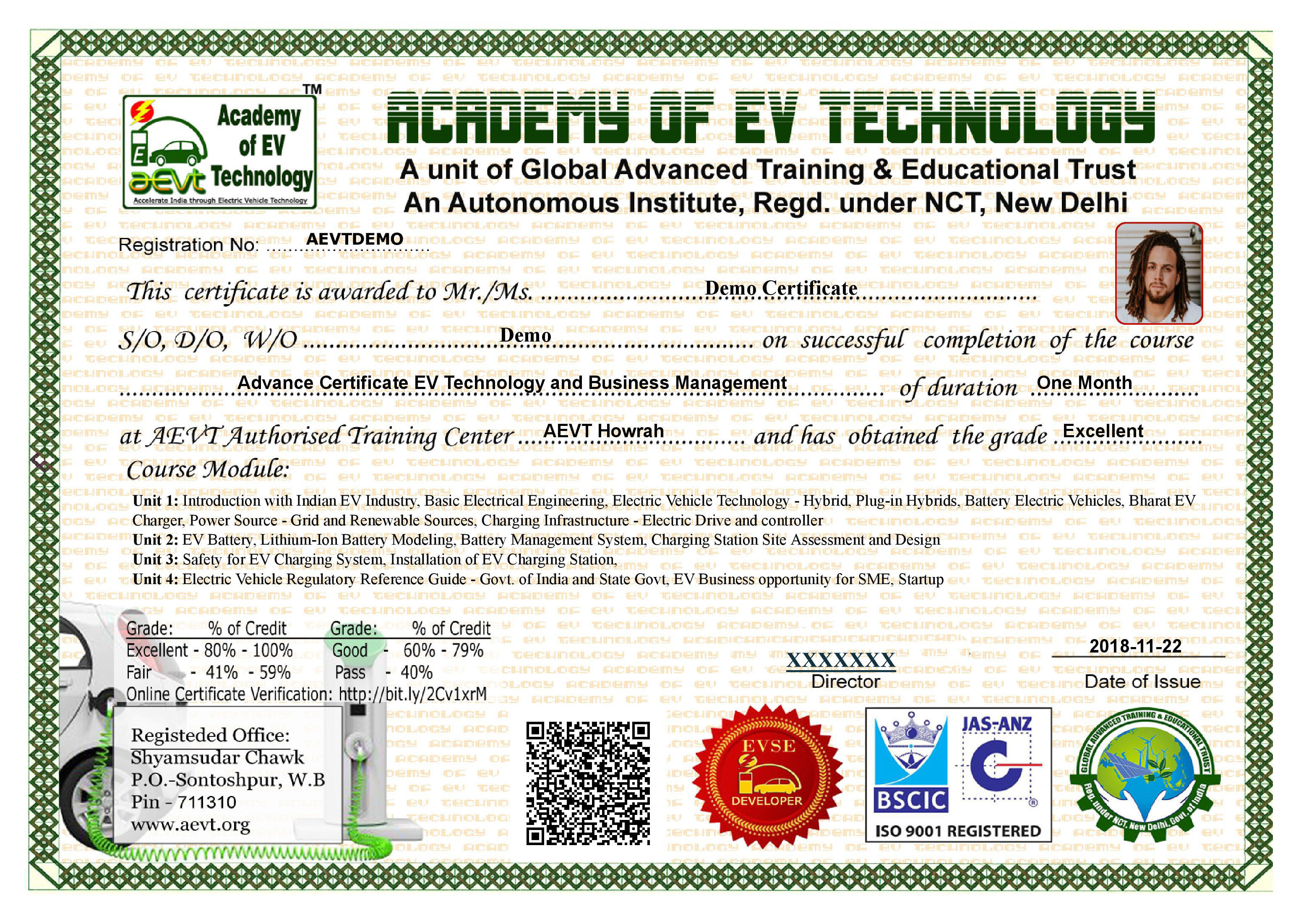Electric Vehicle Course Categories
- Master Degree
- PG Course
- Startups/Business Course
- Job Course
- Research and Development
Masters Degrees (Electric Vehicles)
| Program Title | University | Duration |
|---|---|---|
| Master in Electric Vehicle Engineering | Sweden’s leading university | one-year programme |
| MSc Mobility Engineering | Politecnico | 2 years |
| MSc Automotive Engineering for Electric Vehicles | University of Bedfordshire | 1 yera |
| PG Program in Electric Vehicle Powertrain | Joint program with UPES and Academy of EV Technology | 10 Months |
| Certificate in EV Technology | Joint program with UPES and Academy of EV Technology | 3 Months |
Startups/Business Course
| Program Title | Offered by | Duration |
|---|---|---|
| EV EVSE Business Management Course for Entrepreneurs | Academy of EV Technology | one Month |
| Lithium-ion Battery Pack Assembly Line | Academy of EV Technology | One Month |
| Electric Vehicle Charging Station Design, Installation | Academy of EV Technology | 1 Month |
| Program Title | Offered by | Duration |
|---|---|---|
| PG Program in Electric Vehicle Powertrain | Joint program with UPES and Academy of EV Technology | 10 Months |
| Certificate in EV Technology | Joint program with UPES and Academy of EV Technology | 3 Months |
Electric Vehicle Technology Advance Certificate Course
The modern electric powertrain is relatively new for the automotive industry, and engineers are challenged with designing affordable, efficient and high-performance electric powertrains as the industry undergoes a technological evolution.
Four-part of this practical training provides a comprehensive review of EV systems and the associated energy sources, power electronics, machines, and EV Charging technology.
The first part of this training begins with basic electrical and mechanical overview of electromobility and the related environmental impacts motivating the development of the electric powertrain. Vehicular requirements for electromechanical propulsion are then presented.
The second part of this training features in-depth analysis of the electric powertrain traction machines, with a particular focus on the induction machine and interior-permanent magnet ac machines. The brushed dc machine is also considered due to its ease of operation and understanding.
The third part of this training, the theory and applications for the propulsion, charging, public charging station, battery pack production line development, accessory, and auxiliary power electronics converters.
The fourth part presents commercial aspect of EV equipment development, production unit, public charging station network development and Business Model, Govt. Policy and case study.
The course will cover the following-
| # | |
|---|---|
| 1 | scenarios of electric vehicle industry |
| 2 | Basic Electrical Engineering - Major Components in an Electric Vehicle Powertrain - Vehicle Dynamics, Motor, Electronic components |
| 3 | Electric Vehicle Technology - Types of Electric Vehicle, Clarification & Specification Discussion on Electric Vehicle charger |
| 4 | Power Source Grid and Renewable Sources |
| 5 | Charging Infrastructure Development - Electric Vehicle Supply Equipment, National & International EV Standard Codes, |
| 6 | EV Battery - Lithium-Ion Battery Design, Battery Charging Methods & Some Aspects of Battery Pack Design, |
| 7 | Battery Management System - Battery Monitoring, Automotive BMS |
| 8 | Charging Station Site Assessment - Design Guidelines and Site Drawings, Site Issues, Station Configuration |
| 9 | Charging Station Design - Selection and Sizing of charging station, Solar powered electric vehicle charging station, Single line diagram of charging station |
| 10 | Safety for EV Charging System - Electrical safety, Charging Safety |
| 11 | Installation of EV Charging Station - Installing an outdoor public station, Pedestal Charging station, Installation Procedure |

Business Opportunity
The Ministry of Power has said that now no separate licence will be required for set up charging infrastructure for electric vehicles under the provision of the Electricity Act 2003, the government is looking to give a further boost to e-vehicles by opening up the playing field to individuals. The person should apply for connectivity and the distribution company is bound to provide connectivity
Skill Requirement
Even though awareness for electric vehicles has increased multiple times but the skill level and base knowledge required to develop electric vehicles and to understand them is still limited. This creates a gap in demand and supply which is currently filled by buying off the shelf products from limited players in electric component industry.
See AEVT Course Syllabus
Infrastructure Training
Whether the consulting engineer, the facilities manager or the fleet manager, we give you the tools to ensure your EV infrastructure plan is right for the job.
Certificate will be Awarded by
Academy of EV Technology, A Unit of Global Advanced Training & Educational Trust, Regd. under NCT New Delhi, Govt. of India
Eligibility
- Experienced Working Professional - Technical or Management, Entrepreneurs
- B.E / B.Tech or Graduation in any stream
- Minimum Educational Qualifications: Diploma in any stream with working Experience
- Minimum age 18 years, No Upper Age bar for Entrepreneurs
Medium:
English, Hindi & Local Language
(Book & Online Examination in English)
Training Methodology:
E-Learning Content for Self Learning:
We provide access to our Learning Management System (LMS) that includes resources from e-books, assignments, Audio-Video links and web-links from our online E-Library. The LMS is accessible via smart phones and tabs, and is available in our E-Library website.
Live Interactive Classes:
Our expert faculty members take session on each paper that is delivered through live webinar sessions. These sessions are joined by students from India and Abroad. Key concepts, case studies and real life examples are discussed. Students also get chance to clarify their doubts / academic clarifications. If by any chance you miss these live classes, don’t worry, the recorded sessions are uploaded in the E-Library/LMS.
HelpDesk – Solve your queries instantly:
Helpdesk Support is Available for all students in AEVT in the defined business hours. All learners can connect via Email & Chat. Helpdesk Connect learners to all departments of AEVT. Issues raised via Email & Tickets answered within 24 Business Hours. We encourage students to use this facility.
Training Materials:
- FREE e-book
- FREE E-Library for future study on up-to-date technology, project guide, National & International FREE Article
- EVSE, sample financial models etc.
One Month Course Syllabus:
Unit: BEE
- Major Components in an Electric Vehicle Powertrain - Vehicle Dynamics, Controllers
- Different Types of High-efficiency Motor Technology
- Motor Types
- Selection and sizing of Motor
- Motor Control Functions and Applications
- Selection methodology
- Power Converters
- PID Controlled PWM
- Others Electronic components - Switches, High-performance Control Circuit, Microcontrollers, Gate Drivers, Snubber Circuits, Electric engine, Regenerative braking
- Grid and Renewable Sources - Effect of EV charging on the Distribution Grid
Unit: EVT
- Electric vehicle configuration Vehicle Dynamics
- Types of Electric Vehicle -
- Hybrid Electric Vehicles
- Plug-in Hybrids
- Battery Electric Vehicles
- Type of Charger
- Clarification & Specification Discussion
- Bharat EV AC Charger (BEVC-AC001)
- Bharat EV DC Charger (BEVC-DC001)
- DC Fast Charging
- Basic principles of regenerative braking, Basic principles of conventional braking
BFC
A brief classification of li Ion cell technology and its electro-chemistry. Advantage and disadvantages of over different cell technologies.
- BATTERY ENERGY STORAGE SYSTEM (BESS)
- Relationship between Power and Energy
- Energy storage capacity
- Type of Battery / Cell
- Lithium-ion cells Cathode and Anode Materials
- Type of Lithium-ion Cell
- Main characteristics of lithium cell chemistry types
- Comparison of Lithium-ion Chemistries
- Safer battery materials
- Indian Li-ion Battery manufacturers
BCP
Know your Lithium-ion Cells, Cell Specifications & Performance Parameters. Classification of li-Ion cell technology and its electro-chemistry. Advantages and disadvantages of over different cell technologies
- Capacity, Capacity Retention
- Rated Voltage and Operating Voltage
- cell Datasheet
- Working voltage, Self –discharge voltage
- Continuous current and Peak Current
- Constant voltage / constant current(CVCC)
- C-rate, c-rate effects
- State of Charge (SOC)
- Li-ion Battery Voltage vs SoC
- State of Health (SOH)
- State of power (SOP)
- Internal resistance
- Depth of Discharge (DoD)
- Cycle life of Li-ion batteries
- Lithium Batteries Degradation
- Lithium Ion Battery Failure Modes
- Battery Thermal Runway
- Degrade of Battery Pack cycle
LiCC
An industry detail of Li-ion battery cells, covering the most popular sizes, formats, and chemistries. Given the diversity of Li-ion cells available, the focus is on cylindrical and prismatic cells in metal cases. A brief discussion on li-ion cell chemistry, Cell Anode, Cathode, Electrolytes, binder and Separators materials
- Cell Chemistry Trends
- Cell Anode and Cathode materials
- Cathode Metal Composition
- Active Material, Inactive Material, SEI formation
- Dendrite growth
LiCA
A brief discussion on insights into architecture, design and manufacture of electrodes for lithium-ion cell, Cell Anode, Cathode, Electrolytes, binder and Separators materials.
- This chapter investigates the effects of electrode thickness, porosity, pore size and particle size at the electrode level.
- Architecture design and manufacturing processes for high-performing lithium-ion batteries
- Lithium ion battery Basic Structure
- Cell components
- Anode, Cathode, Electrolytes and Separators materials
- CID, PTC, Safety Vent, Gasket, Plastic Parts
- RAW MATERIALS TO SUBCOMPONENTS
- Common sizes of cylindrical Li-ions
BTM
This chapter identified analyses and approaches that engineers should consider when they design a battery thermal management system. A brief discussion on Thermal Design of Battery Pack.
- Thermal runaway of Battery Pack
- Anode active material failure mechanism
- Cathode active material failure mechanism
- Electrolyte failure mechanism
- Separatore failure mechanism
- Current collector failure mechanism
- Required Functions of Thermal Design
- Low temperature effects
- High temperature effects
- Modes and Function of Battery Thermal Management Systems
- Air Cooling System
- Liquid Cooling System
- PCM material cooling system
BMS
Learn the high-level basics of what role battery management systems (BMSs) play in power design and what components are necessary for their basic functions.
- What the BMS does for battery?
- Function of BMS - Safety, Performance, Longevity, Consistence, Temperature Monitoring and control
- Type of BMS
- Cell Balancing
- Real Time Operating System of BMS
- Example of BMS Wiring Diagram
- How we can select perfect BMS for your battery pack?
BPC
Battery pack differ in size, geometry, and individual cell parameters as capacity and supplied power. A brief discussion on li-ion cell selection, BMS selection for different types of battery.
- Design Considerations of Battery Pack
- Cell Selection
- BMS Selection, Thermal Selection
- High Voltage Side Design
- Low Voltage Side Design
BPS
A battery pack consists of cells connected and made into modules, and modules connected into series and parallel connections to suffice the overall load requirements. A brief discussion of different sizes of battery pack used for electric vehicle & energy storage.
- How to make a Battery Pack?
- The basic calculations that are used in battery design
- Battery pack Technical Specification
- Battery pack designing
- Battery Module and Battery Pack Construction Methods
- Cylindrical and Prismatic Battery Pack
BPA
A brief discussion of battery module/pack making equipment/accessories. Trainees can learn how to make battery modules and Pack.
Battery Pack Accessories
- Material need to assemble battery Modules & pack
- Wires, connector selection, heat shrink, cell holder
- Different types of accessories related to battery pack construction
Battery Module & Pack Making
Battery module / Cell block assembly process- Supply and testing of battery cells & sorting
- Cleaning of cells (plasma cleaning)
- Stacking of modules to form cell block
- Module Formation, Spot Welding, Laser welding
- Thermal management - Application of glue,
- Insertion of cells in modules- Pre-assembly
- Busbar installation
- Module BMS integration, Testing
- Screw fitting of battery module housing
- Integration of cell block in pack
- Application of temperature conductive paste
- Screw fitting of battery housing (housing substructure + housing upper structure)
- Flashing of modules
- Leak testing (helium)
- EOL testing (source-drain)
- Insulation test
- Failure test
CPT
Battery cell testing helps develop better electric vehicle batteries that pack more power density to give longer range performance. Batteries go through an acceptance inspection before they are put together into modules and packs.
- Cell, Module and Pack industry slandered Test
- Testing Equipments and Lab
BPAL
A brief knowledge of Battery Pack Assembly Line development, required machinery details (manual, semi-auto and automatic production line), national & international vendors contact details, required lenience and documents, Financial Report.
Battery Pack Assembly Line
- Manufacturing process of battery pack
- Safety Considerations for BMS (Thermal Runaway, Short Circuit Detection etc)
- Functional Safety Overview
- Brief discussion about different machineries used in manufacturing
- Flow chart of assembly process of li ion battery pack
- Technical details of manufacturing machineries
Battery Pack Assembly Line Development
- Li-ion Battery Assembly Line
- Assembly Machinery and Functional Specifications
- Different size of Module and Pack
- List of Vendors of Raw materials and Machinery supplier
Financial Projection of Li-ion battery pack Manufacturing
- Cost analysis of different machineries and manpower requirements
- Return of Investment (ROI) of li ion battery pack business
- Business projection to start a li ion battery pack business
LBO
A business guide and motivation session for startups, entrepreneurs on Lithium-ion Battery Pack Assembly business and Battery Swaping business.
Future trends in Energy Storage Battery and Customized Battery
- Energy Storage Battery Solar Street Light Battery, Outdoor Battery
- Industrial Energy Storage Battery
- Customized Battery -
Customized solution on demand for Consumer electronics, Smart Home Appliance - Floor Cleaner, Vacuum Cleaner, Smart Door Lock, Smart Camera, Home Light, Smart Lamp, drown battery etc
Trends in Indian electric vehicle domain
- 2 wheeler and 3 wheeler battery market
- Wireless charging of EV
- Battery swap technology
Business Model/Case Study
- What is the size of the EV market in India?
- Govt. Policies and Regulations
- Business models,
- Choose best product/item as per your planing
- Battery swapping,
Lab Practical
- Cell Selection - Ah testing, IR testing
- Charging Discharging test, cell balancing
- Battery Pack Construction
- Module/Pack Spot Welding
- BMS Selection and Connection (as per System Design)
- Pack testing
- Battery Pack Casing
- Battery Pack Leveling
- Battery Pack Boxing
Unit: CI
- Introduction to EV Charging technology
- Onboard charging and Off-board charging
- AC charging vs DC charging
- Conductive Charging - AC & DC
- Inductive Charging Static
- Inductive Charging Dynamic
- AC charging - Type 1,2,3
- DC charging - Chademo, Tesla, CCS
- Fast charging and its limitations
- Smart charging and applications
- Introduction of Vehicle to grid (V2G) technology
- Introduction of Wireless charging of EV
- On-road charging of EV
- Battery swap technology
- Solar-powered EVs
- Electric Vehicle Supply Equipment -
- Different types of EV charger connectors
- single-phase or three-phase socket
- SAE J1773
- CHAdeMO standard - DC fast charging
- SAE J1772 Combo
- Cords and Cables, Earthing, Lightning Protection of Electric Vehicle Charging, Residual current device (RCD)
- National & International EV Standard Codes - IEC applicable for EVSE
Unit: CSA
- site analysis for EV charging station
- Choosing the location - Public charging stations
- Site Selection Considerations, General Site Issues, URDPFI Guidelines, Planning Considerations
- Design Guidelines and Site Drawings, EVSE Typical Site Plans, Station Configuration
Unit: CSD-1
- Energy consumption
- Guidelines on Charging Infrastructure
- Public Charging Infrastructure (PCI) - Components of charging station
- Finincial Detail of charging station
- Proposed Tariff for EV Charging
- Electric Vehicle Charging Tariff in Different States of India
Unit: CSD-2
- PLANNING FOR YOUR STATION
- Solar powered electric vehicle charging station
- Calculation and selection - Components of charging station
- Finincial Detail of charging station
Unit: CSD-3
- Design On-Grid solar charging stations for a parking lot
- Plans for EVSE Installation
- Single line diagram of charging station
- EV Related Signage
Unit: SEV
- Electrical safety from the charging socket to the electric vehicle
- Different aspects of electric safety
- Electric Vehicle Charging Safety Guidelines
- Protection against electric shock, fault protection
- IEC IEC 60068-2 (1,2,14,30), IEC 61683, IEC 60227, IEC 60502 IEC 60947 part I,II, III ,IEC 61215 and more
Unit: ICS
- Charging Station Permitting
- Execution of work
- Installation Instruction
- Installing an outdoor public station
- Pedestal Charging station
- Installation Procedure
Unit: EVB
Future trends in electric vehicle domain
- Wireless charging of EV
- On-road charging of EV
- Battery swap technology
- Solar powered EVs Charging EVs from renewables
Business Model/Case Study
- What is the size of the EV market in India?
- Govt. Policies and Regulations
- Business models, Utilities , Charging space providers, Battery swapping, Digital and information technology
- Business Model
Next Batch Admission Going-on: Limited Seats! Contact with Admission Depertment
Discount on Live Class Fees= 0.20
Online Live Class Fees: Rs. 16965/-
Hands on Practical Fees: Rs. 3999/-
All Fees including 18% GST
Pay Now Online Live Class Fees only.
Submit Registeration for this course:
Submit Registration
Become an EV Expert with Verified Skill Certification

1. An Autonomous Institute registered under NCT, Govt. of India under Indian Trust Act.
2. Registered Under NGO-DARPAN, NITI Aayog Govt. of India
3. ISO 9001:2015 registered Educational Trust
4. Registered under 80G and 12A and CSR Act, Govt. of India
5. Practical and Research Lab at GATE Trust Howrah, West Bengal
6. GATE Research - Research unit of Global Advanced Training and Educational Trust. You can Write & Publish a Review/Research paper,
Quick Inquiry Form

Interactive Session

Practical & Doubt Session

E-Library Study Materials

Online Evaluation











